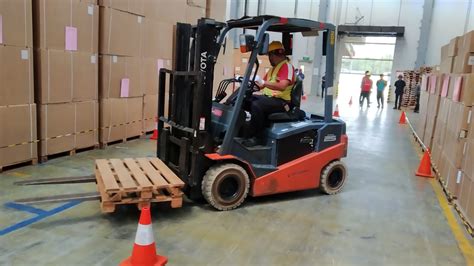
Canada’s logistics and warehousing industry is growing rapidly, and forklift operators play a crucial role in ensuring the smooth movement of goods in warehouses, construction sites, and manufacturing plants. This growth has led to an increased demand for skilled forklift operators across the country. As an immigrant, securing a forklift operator job in Canada with visa sponsorship is a promising opportunity because many companies are looking capable hands to fill these critical roles.
If you’re looking to work in Canada as a forklift operator, this article will guide you through the essential skills and experience required for entry-level positions, the certifications needed, regions with the highest payment structures, salary expectations, and how visa sponsorship works for this role. Whether you’re already experienced or looking to start a new career, this information will help you navigate your way to success.
Entry-Level Skills for Forklift Operator Jobs in Canada with Visa Sponsorship
To start your career as a forklift operator in Canada, certain basic skills and experiences are necessary. Employers often seek candidates who can demonstrate proficiency in operating machinery safely and efficiently. Here are the essential skills and experiences:
- Basic Knowledge of Forklift Operation
Forklift operators are expected to have hands-on knowledge of forklift equipment, including both counterbalance and reach forklifts. Training on these machines is provided, but having familiarity with their basic operation will give you a competitive edge. - Attention to Detail
Forklift operators must have strong attention to detail to ensure goods are handled safely without damage. Attention to small details like weight capacity, balance, and safe load positioning are vital. - Physical Fitness and Stamina
Forklift operation can be physically demanding, requiring operators to sit for long periods and occasionally lift or move heavy objects. Employers often look for candidates with good physical health and stamina. - Understanding of Warehouse Layouts
Knowing how to navigate efficiently through a warehouse is an important skill. Understanding warehouse layouts, including aisle systems and storage locations, ensures faster and more accurate material movement. - Basic Communication Skills
Forklift operators must communicate effectively with other warehouse staff, managers, and supervisors. Simple instructions regarding where to place or pick up materials are exchanged regularly, so good communication skills are necessary. - Problem-Solving Abilities
Being able to think on your feet is crucial in warehouse environments. Forklift operators may encounter blocked paths, misplaced goods, or damaged materials. Problem-solving in these situations is essential for smooth operations. - Teamwork
As forklift operators often work in large teams, a collaborative attitude is important. Whether it’s loading trucks, moving pallets, or storing products, being able to coordinate with other team members is key to success. - Basic Safety Awareness
Understanding basic safety protocols related to forklift operation and warehouse environments is critical. Knowing how to handle equipment safely can prevent accidents and improve workflow efficiency. - Adaptability
Flexibility in handling different tasks, machinery, and working environments will make you an attractive candidate. Forklift operators may be required to switch between machines or work on varying shifts. - Previous Warehouse Experience (Optional but Helpful)
While not always required, previous experience in warehouse settings will make your transition to a forklift operator role smoother. Experience in inventory management or stock handling can also be advantageous.
Certifications Needed to Work as a Forklift Operator in Canada
To legally work as a forklift operator in Canada, specific certifications are required. These certifications ensure that you are qualified to operate heavy machinery safely and in compliance with national standards.
- Forklift Operator Certificate
The most basic requirement for forklift operators in Canada is the Forklift Operator Certificate. This certification can be earned through specialized training programs offered by certified institutions. The course typically covers different types of forklifts, safety regulations, load handling, and maintenance practices. - WHMIS (Workplace Hazardous Materials Information System)
This certification is essential for anyone working in environments where hazardous materials are handled. The WHMIS certification teaches operators how to identify and safely manage potentially dangerous substances in the workplace. - First Aid and CPR
Employers often prefer candidates who are certified in First Aid and CPR. Although not mandatory, this certification increases your value as a forklift operator, as safety is a top priority in warehouse and construction environments. - High-Risk Work Licence (Applicable in Certain Provinces)
Depending on the province where you work, you may need a high-risk work licence if you are operating forklifts in more dangerous environments, such as construction sites or large industrial plants. - Defensive Driving Certificate
While this is not strictly required, having a defensive driving certificate shows employers that you are knowledgeable about operating vehicles (including forklifts) safely in busy or challenging conditions.
Regions with the Highest Payment Structures
Forklift operator salaries in Canada can vary significantly depending on the region. Some areas are known for offering higher wages due to the cost of living or the demand for skilled labor. Here are five regions in Canada with the highest payment structures for forklift operators:
- Alberta
Alberta is known for its thriving oil and gas industry, and many warehouses support this sector. Forklift operators here can expect to earn between CAD 20 to CAD 28 per hour due to high demand in logistics and industrial sectors. - Ontario (Greater Toronto Area)
The Greater Toronto Area is a major logistics hub, and forklift operators are in high demand. Salaries in this region range from CAD 19 to CAD 26 per hour, depending on experience and the type of work environment. - British Columbia
With Vancouver as a major port city, the need for skilled forklift operators in British Columbia is high. Operators in this region typically earn between CAD 19 and CAD 27 per hour. - Quebec
In Quebec, particularly in Montreal, warehouse and logistics operations are on the rise. Forklift operators can expect to earn between CAD 18 to CAD 24 per hour, with opportunities to work in a variety of industries. - Manitoba
In Manitoba, the demand for forklift operators in warehousing and manufacturing is steady. Workers here earn between CAD 18 to CAD 23 per hour, making it a competitive region for forklift operator salaries.
Forklift Operator Jobs in Canada with Visa Sponsorship Salary Expectations for Immigrants
The salary expectations for forklift operators in Canada vary based on the province, experience, and the type of industry you work in. Below is a table that outlines the salary ranges for forklift operators across different regions:
| Region | Salary Range (CAD per hour) |
|---|---|
| Alberta | 20 – 28 |
| Ontario (Greater Toronto) | 19 – 26 |
| British Columbia | 19 – 27 |
| Quebec | 18 – 24 |
| Manitoba | 18 – 23 |
As an immigrant, your salary will likely start on the lower end if you’re beginning with entry-level skills. However, with certifications, experience, and knowledge of the Canadian work environment, you can quickly move up the pay scale.
Conclusion
Forklift operator jobs in Canada with visa sponsorship offer a promising career path for immigrants. By obtaining the necessary certifications, gaining relevant experience, and targeting regions with high payment structures, you can secure a well-paying job in this industry. Whether you’re just starting or have prior experience, Canada’s logistics and warehousing sector provides ample opportunities for growth. Start your journey today and take advantage of the booming demand for skilled forklift operators.



